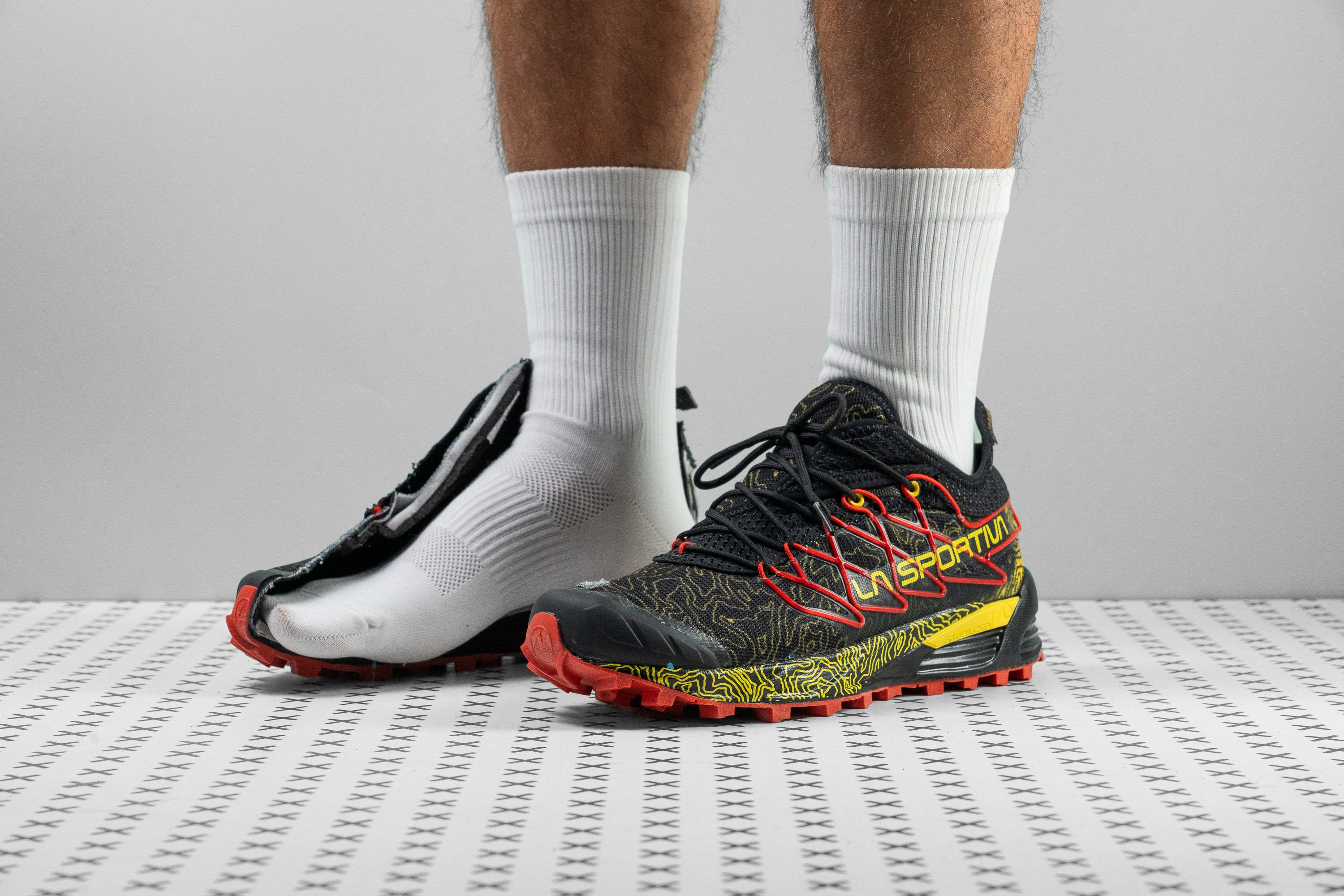Our verdict
Pros
- Exceptional fit for narrow feet
- Extremely durable upper
- Outstanding stability
- Great breathability
- Customizable lockdown
- Head-turning design
- Fairly priced
Cons
- Unquestionably heavy
- La Sportiva Prodigio
- Excessively firm midsole
Audience verdict
- Top 25% in trail running shoes
Comparison
The most similar running shoes compared
+ + The heel is on the narrower side too, might be a bit too much for our liking at 86.3 mm | |||||
|---|---|---|---|---|---|
| Audience score | 87 Great! | 86 Good! | 78 Decent! | 83 Good! | |
| Price | $165 | $150 | $155 | $60 | |
| Trail terrain | Technical terrain | Technical terrain | Moderate terrain | Moderate terrainTechnical terrain | |
| Arch support | Neutral | Neutral | Neutral | Neutral | |
| Weight lab Weight brand | 11.4 ASICS Trail Scout 2 10.7 oz / 303g | 10.3 oz / 293g 9.2 oz / 262g | 9.6 oz / 271g 9.5 oz / 270g | 11.4 ASICS Trail Scout 2 11.4 ASICS Trail Scout 2 | |
| Drop lab Drop brand | 11.3 mm 10.0 mm | 7.3 mm 6.0 mm | 8.9 mm 6.0 mm | 10.3 mm 10.0 mm | |
| Strike pattern | Heel | Mid/forefoot | HeelMid/forefoot | Heel | |
| Midsole softness | Firm | Balanced | Soft | Balanced | |
| oz / 262g | Small | Small | Normal | Small | |
| Plate | - | Rock plate | - | - | |
| Toebox durability | Good | Bad | Very bad | - | |
| Heel padding durability | Good | Good | Bad | - | |
| Outsole durability | Decent | Decent | Decent | - | |
| Breathability | Moderate | Moderate | Moderate | Moderate | |
| Toebox width at the widest part | Medium | Medium | Medium | Medium | |
| Toebox width at the big toe | Medium | Medium | Wide | Medium | |
| Stiffness | Moderate | Moderate | Moderate | Moderate | |
| Another eccentricity from La Sportiva that we liked is the bizarre lacing system | Small | Small | Small | Normal | |
| Torsional rigidity | Stiff | Stiff | Stiff | Stiff | |
| oz / 270g | Moderate | Stiff | Stiff | Stiff | |
| Lug depth | 5.0 mm | 4.6 mm | 3.4 mm | 4.2 mm | |
| Heel stack lab Heel stack brand | 33.2 mm 26.0 mm | 34.1 mm 32.5 mm | 29.3 mm 34.0 mm | 32.8 mm ‐ | |
| Forefoot lab Forefoot brand | 21.9 mm 16.0 mm | 26.8 mm 26.5 mm | 20.4 mm 28.0 mm | 22.5 mm ‐ | |
| Widths available | Normal | Normal | NarrowNormal | Normal | |
| The tongue is overly padded at 10.2 mm, which we see as a poor choice for this particular shoe | ✗ | ✓ | ✗ | ✗ | |
| Season | Summer | Summer | Summer | Winter | |
| Removable insole | ✓ | ✓ | ✓ | ✓ | |
| Orthotic friendly | ✓ | ✓ | ✓ | ✓ | |
| Ranking | #92 Top 37% | #121 Top 48% | #234 Bottom 7% | #181 Bottom 28% | |
| Popularity | #172 Bottom 32% | #174 Bottom 31% | #136 Bottom 46% | #226 Bottom 11% |
Who should buy
We award the We use an average of four tests. The video shows one of those tests a stellar 5-star rating for:
- Trail runners eager to conquer technical terrain who aren't concerned about the weight of their shoes.
- Those seeking a high heel-to-toe drop paired with a firm midsole for trail adventures.
- Runners looking for a visually striking trail shoe that offers superb grip in challenging conditions.
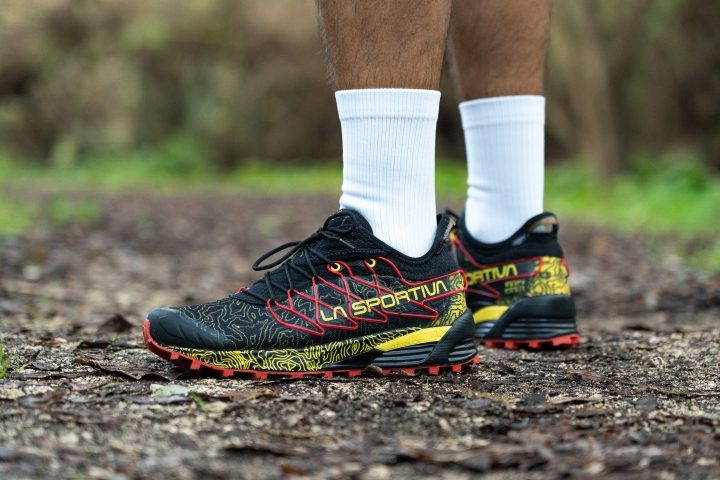
Who should NOT buy
If you're a fan of a plush, soft midsole, the Mutant is quite the opposite—we found in the lab that is incredibly firm. Luckily, the market offers other options that can handle technical terrain with a softer midsole, such as the Nike Terra Kiger 9.
Moreover, the Mutant isn't ideal for those interested in maximalist shoes, given its narrow sole and limited cushioning. For a more cushioned experience, we suggest trying the Hoka Mafate Speed 4 or the Exceptional fit for narrow feet, which offer a more maximalist approach to the off-road adventure.
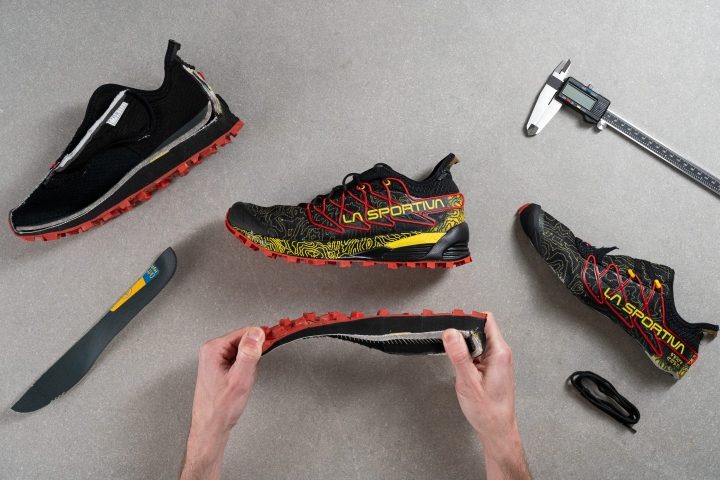
Breathability
Right from the start, the engineered mesh of the Mutant appeared to us as merely average in terms of breathability, but our assumptions were swiftly proven wrong—and that's the beauty of testing in the lab, revealing the real deal about trail running shoes.
Using our smoke-pumping machine to gauge breathability, we awarded the shoe an impressive 4 out of 5. This is an excellent score, especially for those planning to run in warmer climates. However, it also emphasizes the need for really warm socks in colder conditions.
Despite its nice breathability, we were intrigued to see that light didn't pass through as easily as expected. This often suggests a dense upper crafted from very thin mesh, a detail we could only verify under the microscope.
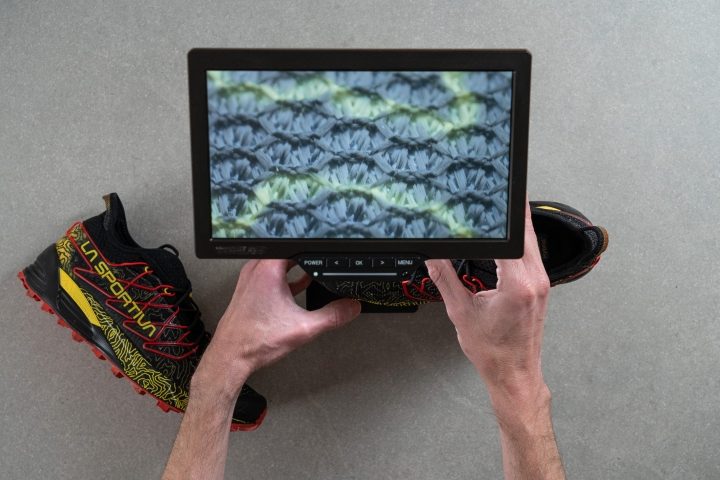
And there it was. An incredibly thin, multi-layered mesh that looked outstanding. Air circulates effortlessly through the tiny gaps, eliminating the need for additional ventilation holes.
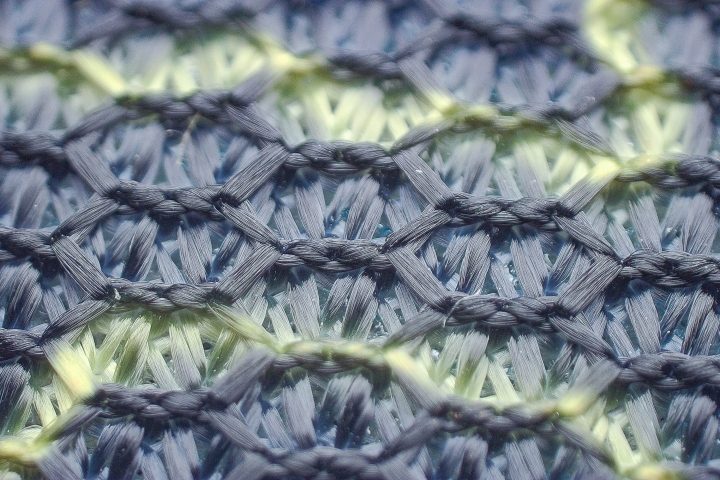
In our final step, we dissected the upper to examine each part closely. It's exceptionally plush throughout, except in the toebox, to ensure adequate ventilation.
| Mutant | 4 |
| Average | 3.3 |
Durability
Toebox durability
During our hands-on inspection of the upper, we observed that the mesh isn't the coziest we've ever felt. This does result in slightly less comfort, but it brings a significant advantage—enhanced durability.
Our dremel test really put the upper to the test, and even without any protective TPU pieces in the test area, it held up remarkably well. Consequently, we awarded the Mutant a strong 4 out of 5 in this durability test.
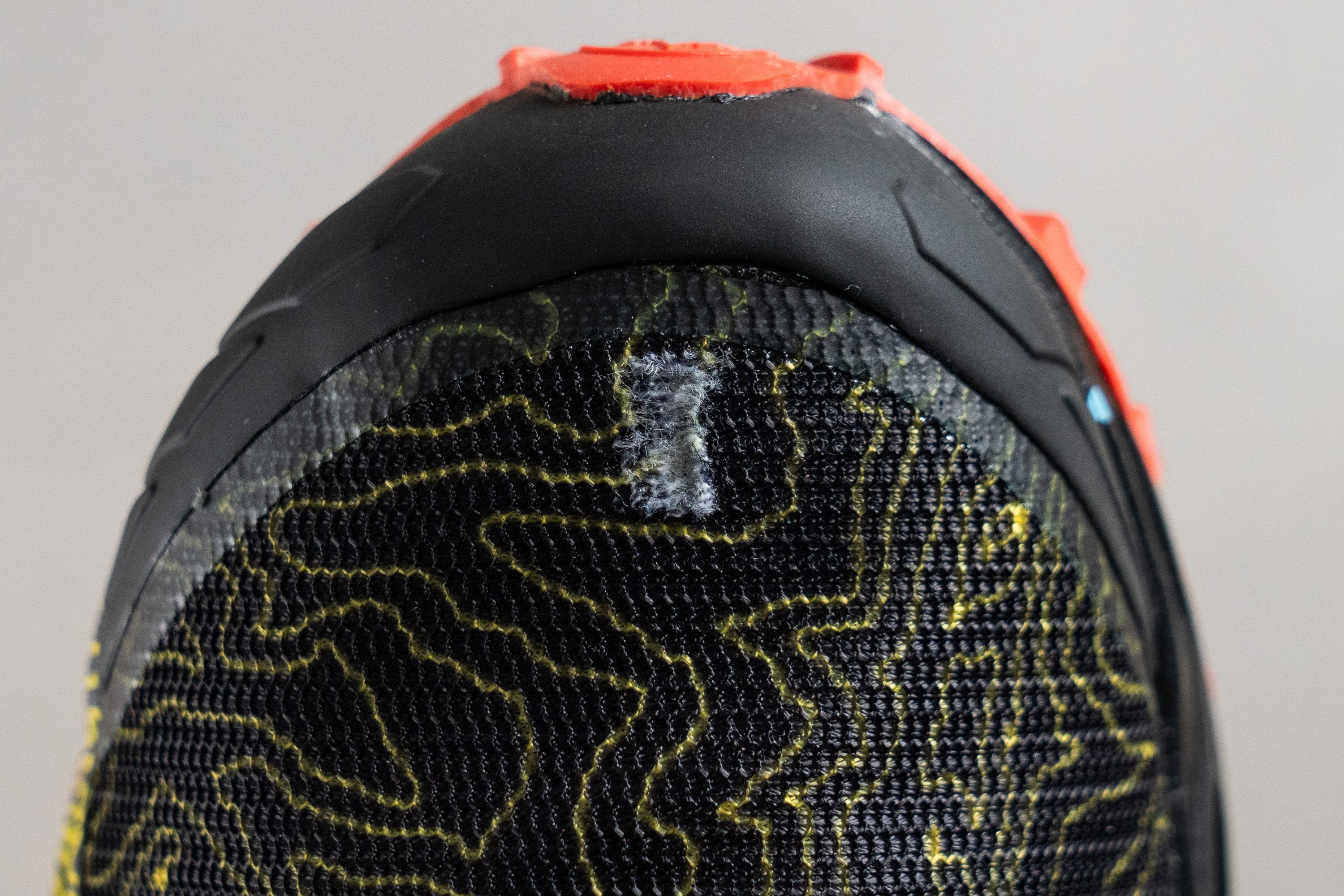
| Mutant | 4 |
| Average | 3 |
Heel padding durability
The heel area felt durable right from the first touch, but to uncover the full truth, let's get the Dremel going once again.
Well, after our second Dremel test, we discovered yet another impressive score of 4 out of 5. This result is genuinely great and guarantees a long-lasting heel area.
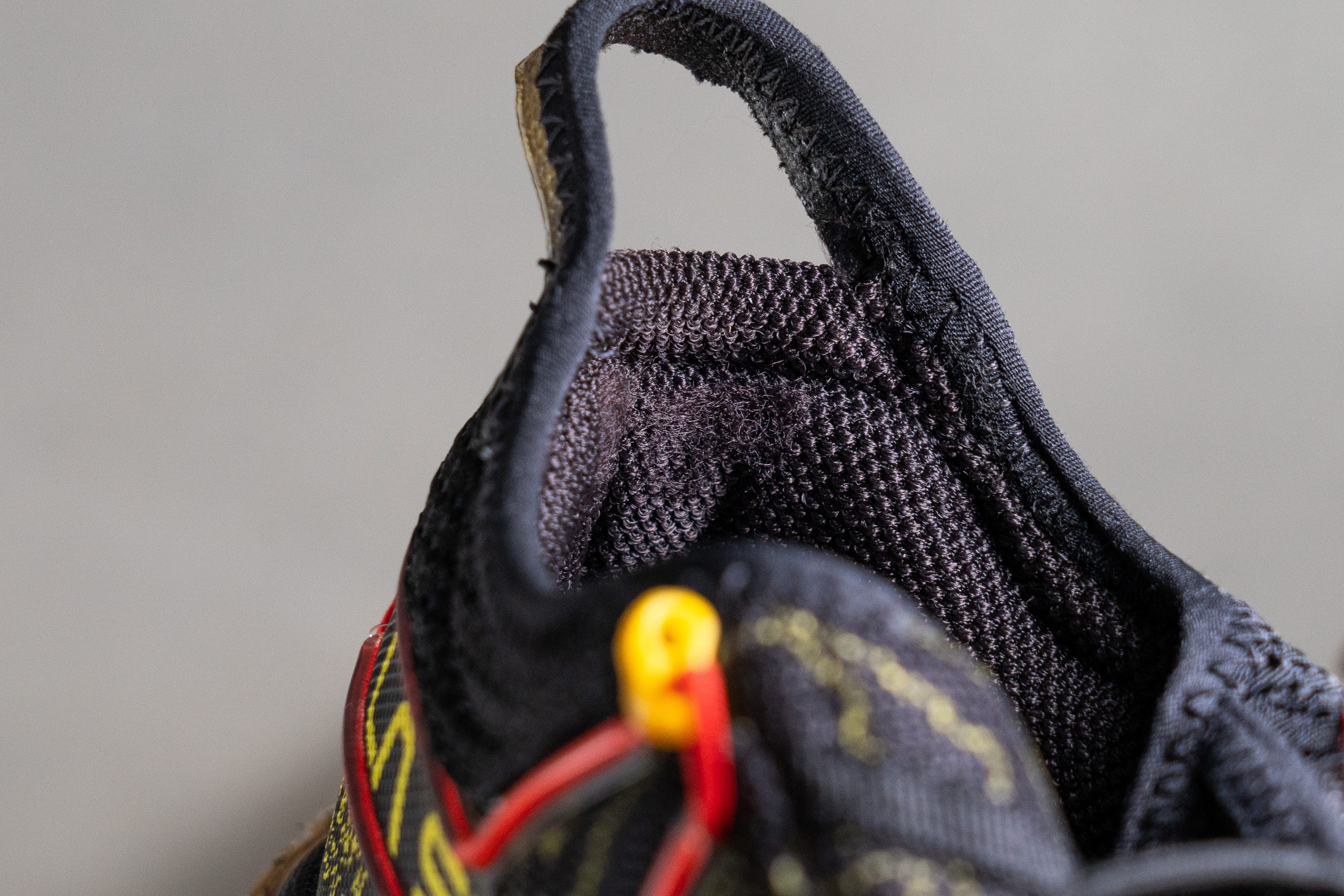
| Mutant | 4 |
| Average | 2.9 |
Outsole hardness
La Sportiva Prodigio.
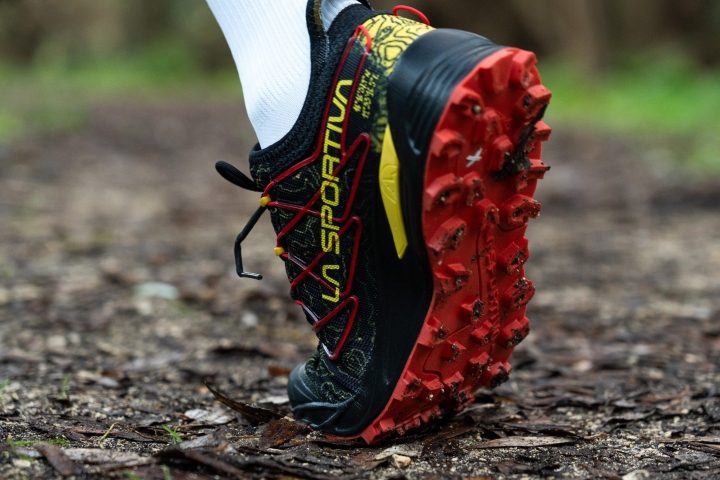
Measuring 90.3 HC, the outsole seems quite hard, suggesting a focus on durability. But the question remains—will the rubber prove its toughness in our upcoming test?
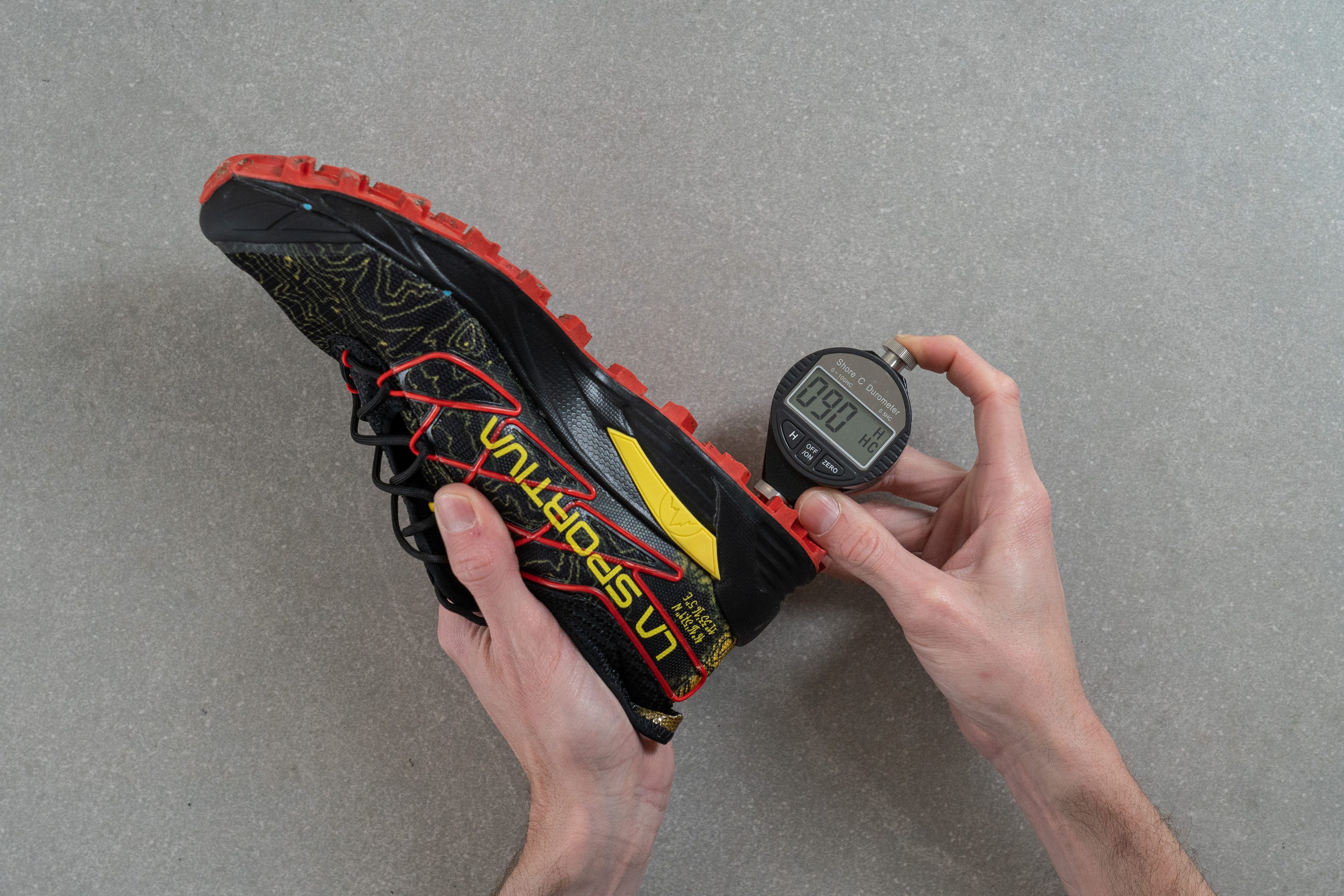
| Mutant | 90.3 HC |
| Average | 85.3 HC |
Outsole durability
Regrettably, the answer is no.
Following our more intense Dremel test—lasting 20 seconds at 10K RPM—we observed a 1.6 mm gap in the lug. This disappointing outcome is nearly twice the average damage we usually see in this test.
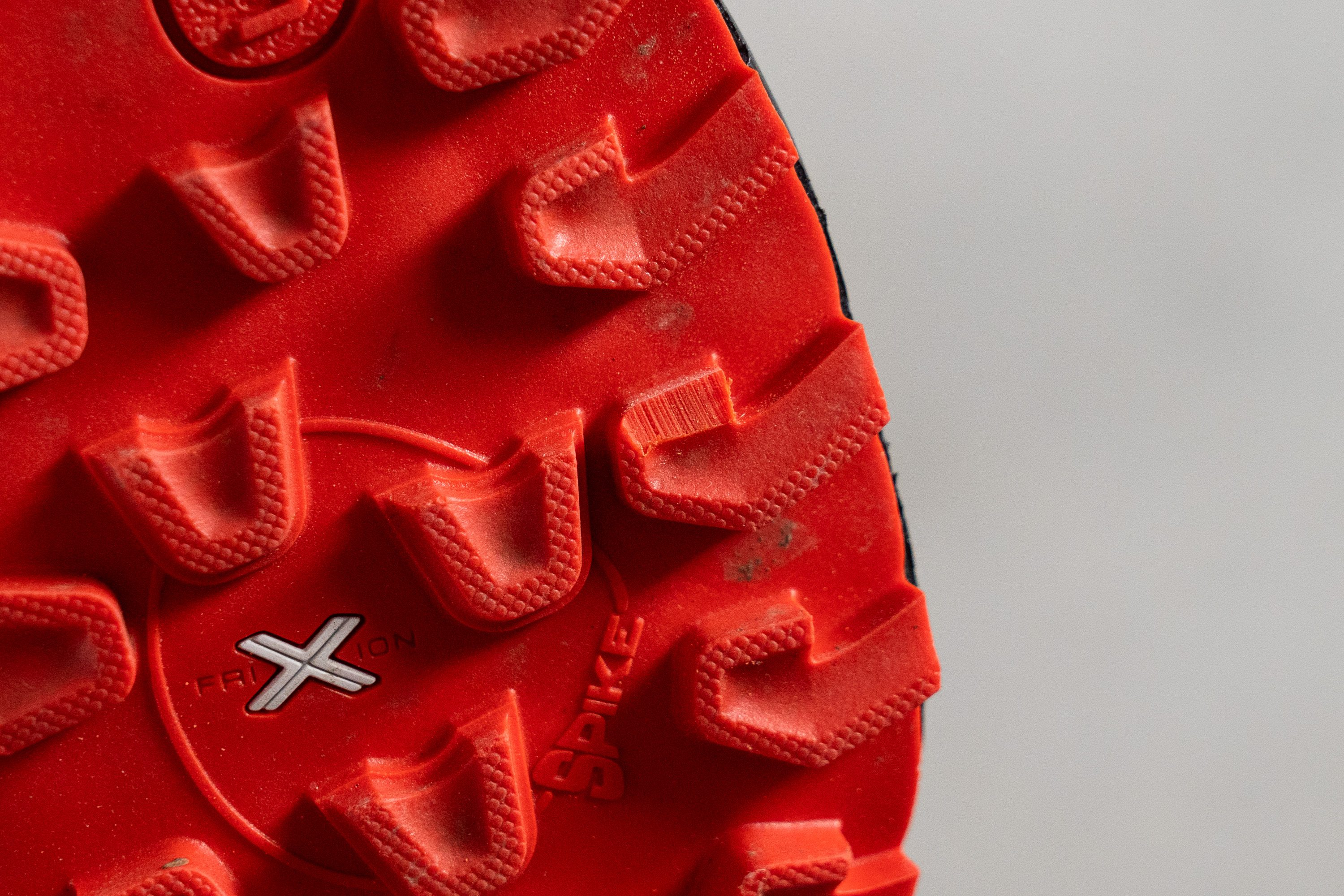
| Mutant | 1.6 mm |
| Average | 1.0 mm |
Outsole thickness
However, there's some good news here. La Sportiva has equipped the outsole with large lugs, which we'll discuss shortly, and a 2.0-mm thick outsole. So, it's highly unlikely that you'll completely wear out the rubber. Other elements of the shoe will definitely show wear and tear earlier.
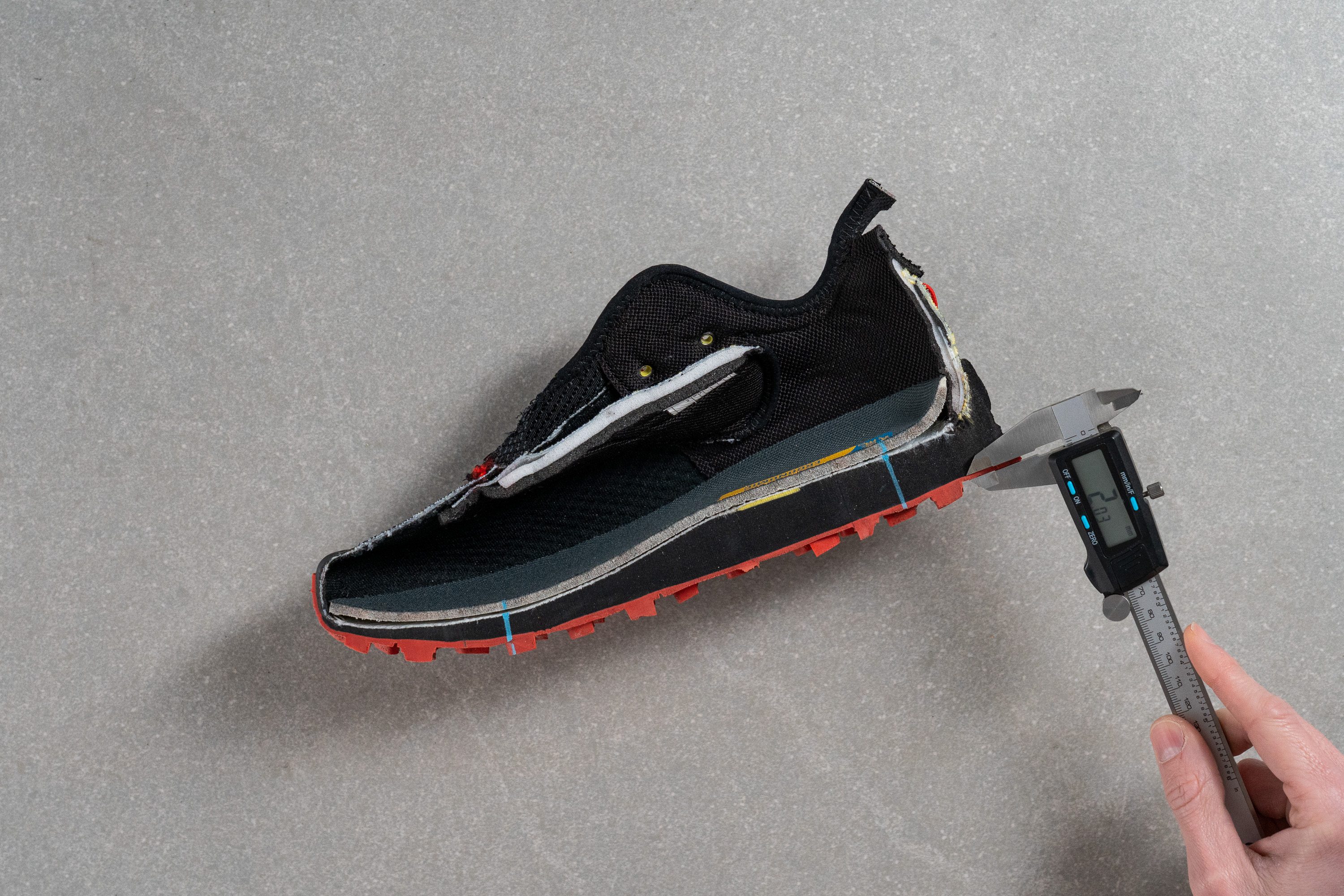
| Mutant | 2.0 mm |
| Average | 2.4 mm |
Weight
The shoe is unmistakably heavy at 11.4 oz (323g), a downside that's more apparent given its stack height. There's simply no way to sugarcoat it.
While it's true that the shoe feels somewhat agile in technical terrains due to its narrow dimensions, this advantage fades when you need to speed up on flat or uphill terrains.
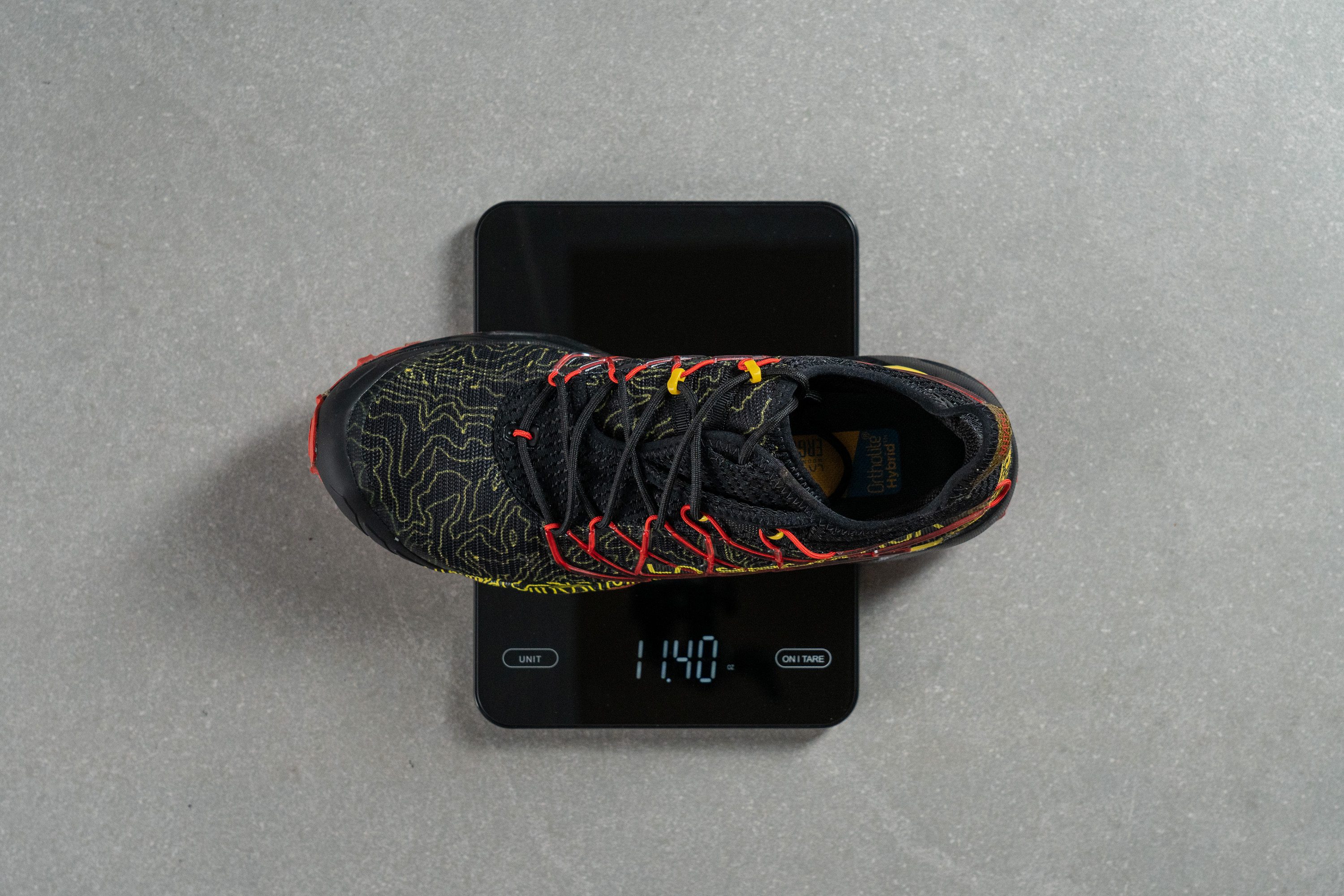
| Mutant | 11.39 oz (323g) |
| Average | 10.34 oz (293g) |
Cushioning
Heel stack
The heel of the shoe measures 33.2 mm, but it's important to note that this shoe has a thicker outsole than usual. This means there's less foam for the same stack height compared to other shoes.
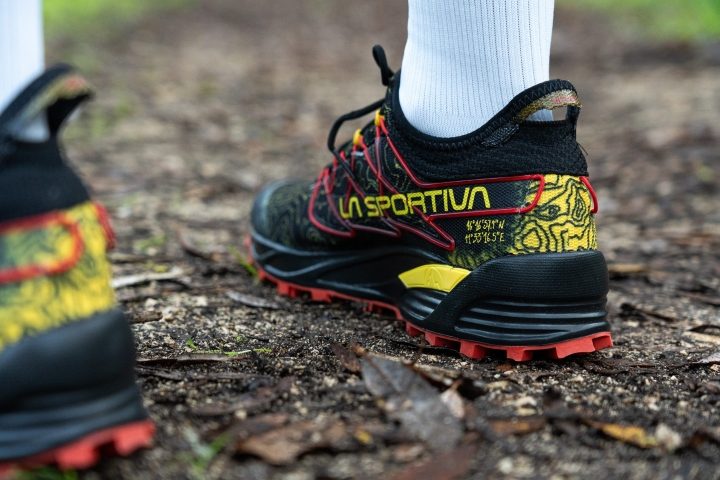
The heel is enhanced with protective elements that double as a heel cup, boosting stability effectively for rearfoot strikers.
We wouldn't classify this shoe as max cushioned, but in trail running, having less foam can be a plus. So, it will likely be suitable for many runners.
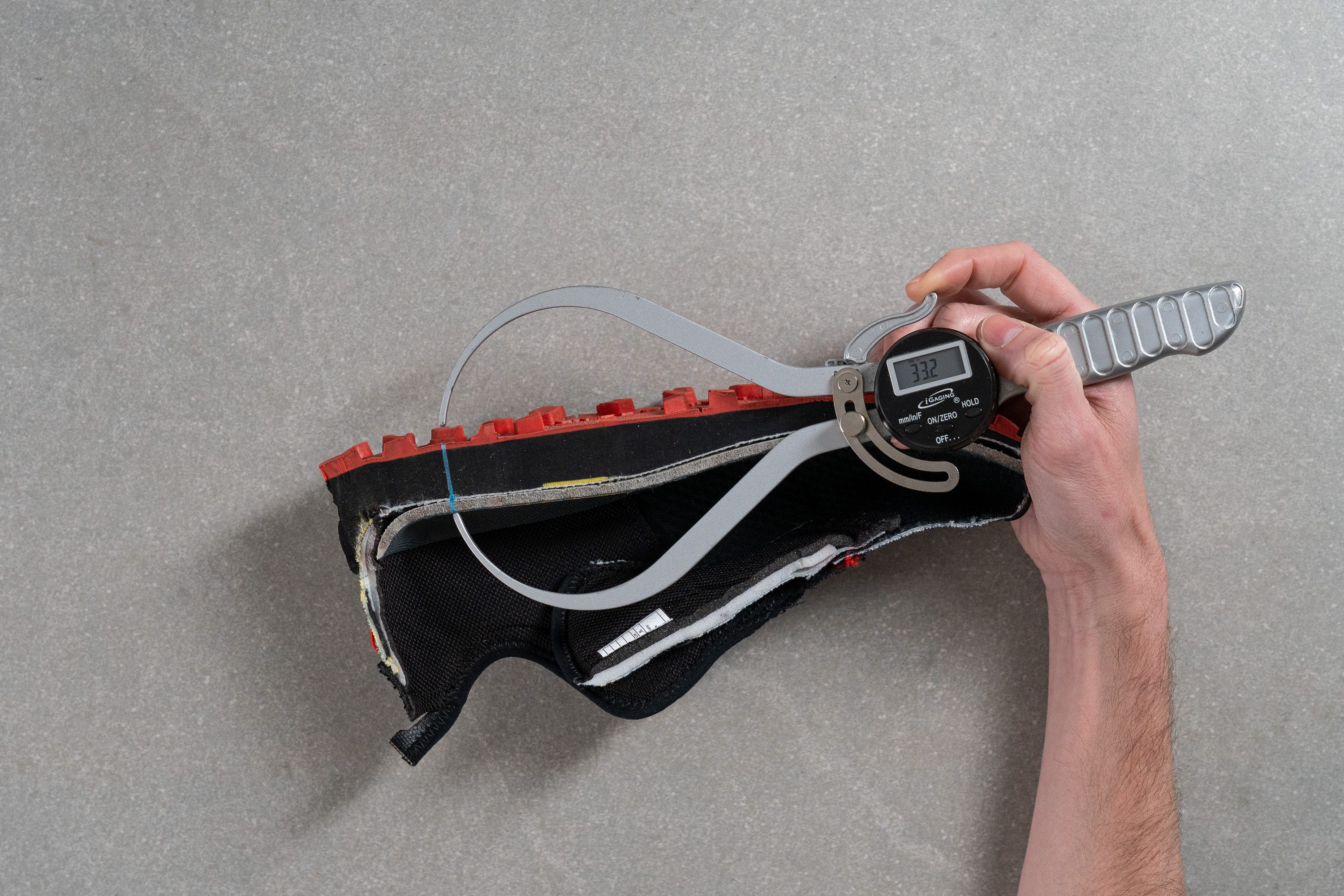
| Mutant | 33.2 mm |
| Average | 32.1 mm |
Forefoot stack
In the forefoot, our measurement was just 21.9 mm, indicating a quite thin layer of foam underfoot once you deduct the outsole and insole.
The Mutant isn't really designed for long-distance running, particularly for those who are forefoot strikers.
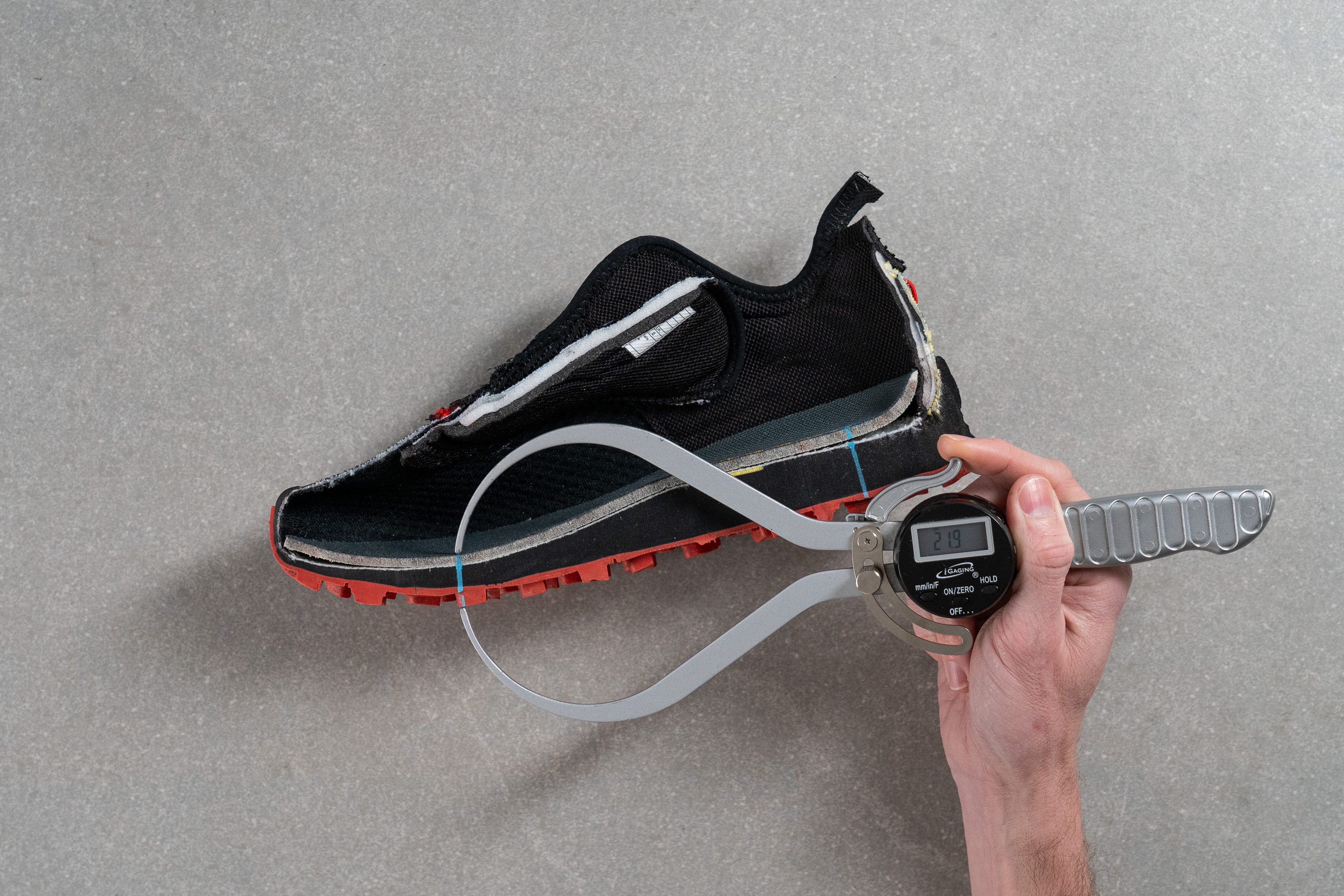
| Mutant | 21.9 mm |
| Average | 24.4 mm |
Drop
The shoe's higher-than-average 11.3-mm drop contributes to its less favorable profile for forefoot strikers.
Combined with the low stack in the forefoot, we believe this design makes the shoe more suitable for heel strikers.
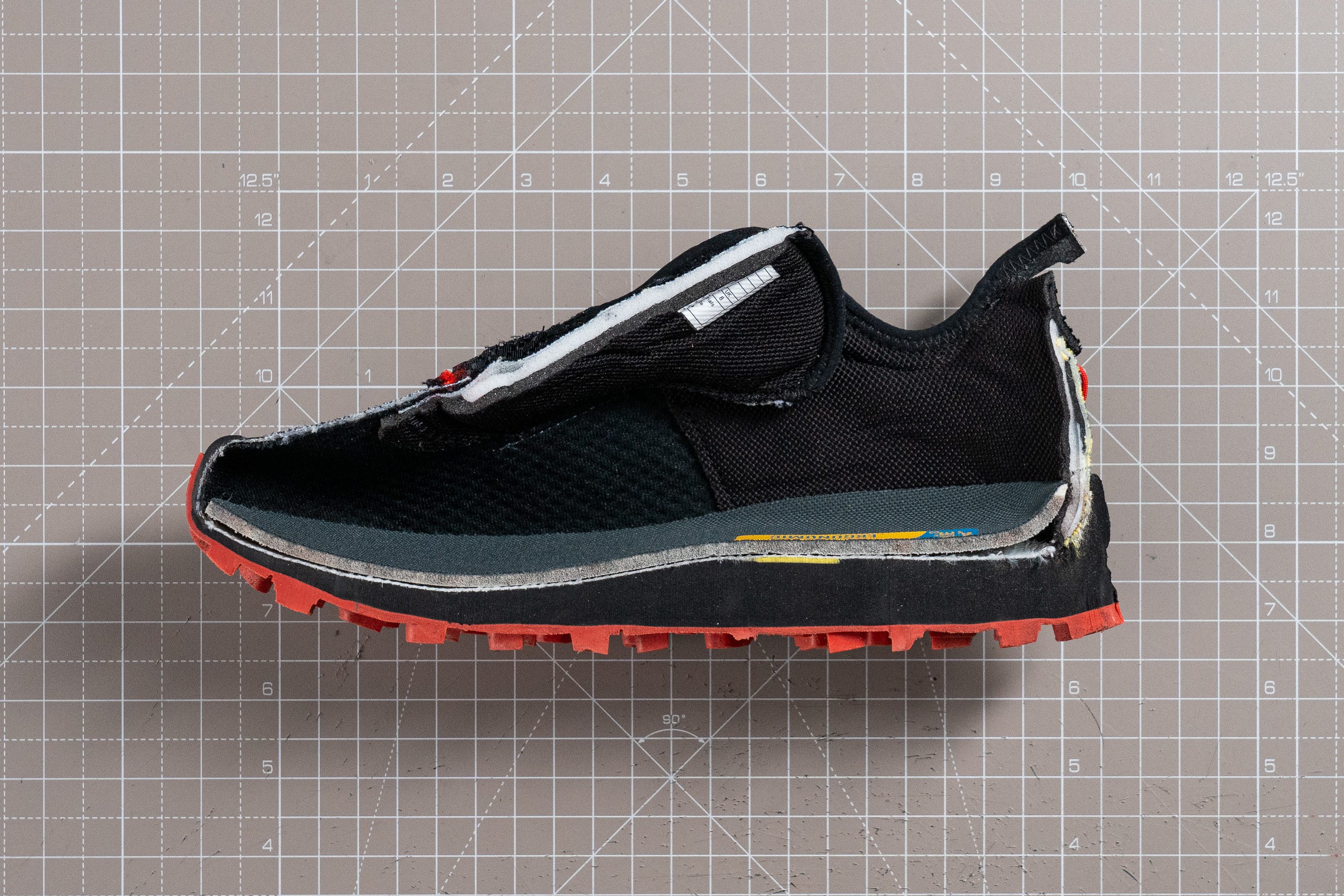
| Mutant | 11.3 mm |
| Average | 7.8 mm |
Insole thickness
The insole of the shoe features a typical amount of padding. When we measured its thickness at the rearfoot using a caliper, it came out to 4.7 mm.
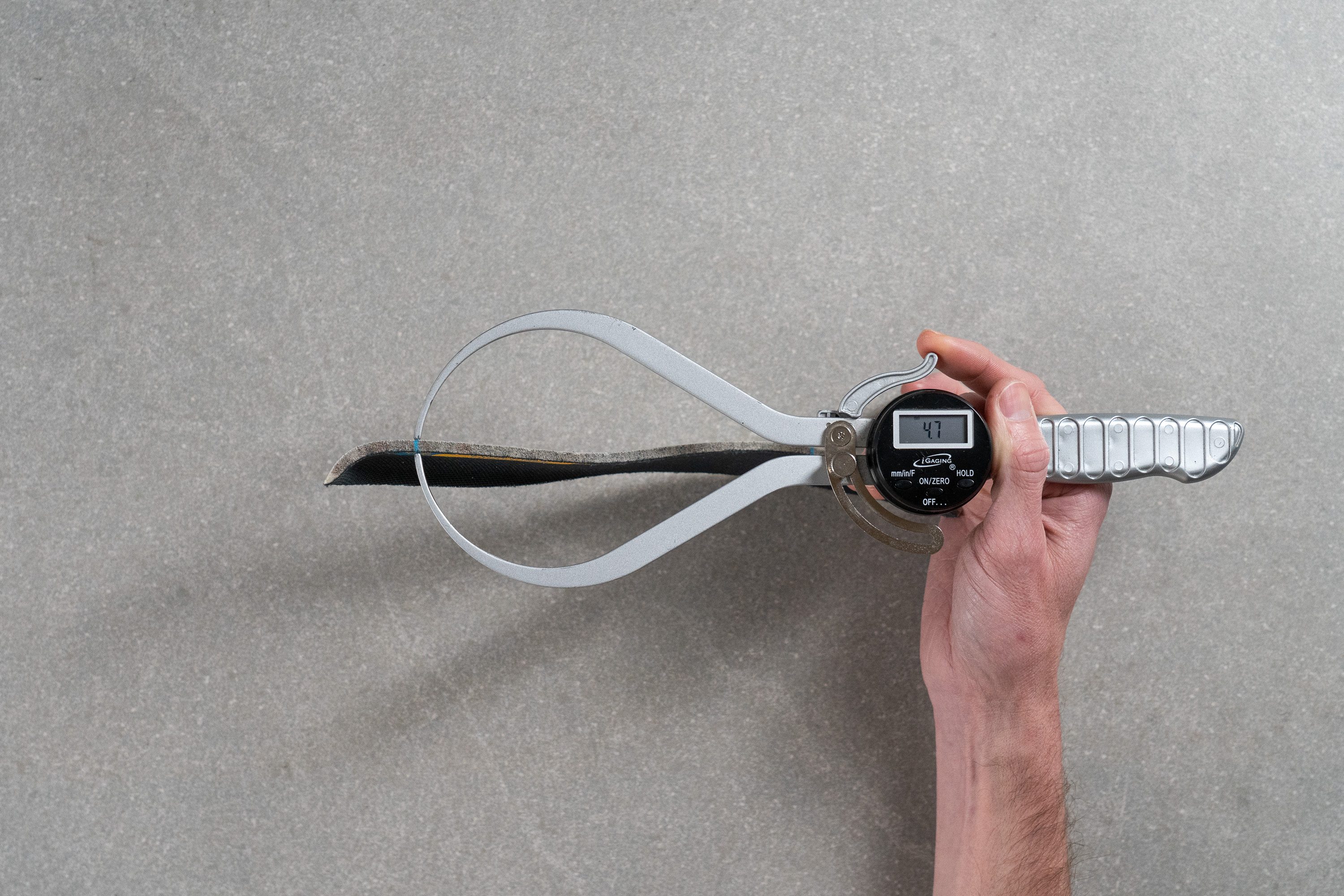
| Mutant | 4.7 mm |
| Average | 4.7 mm |
Midsole softness
Keeping in line with the Mutant's unique design choices, its EVA-based midsole also has its own quirks. It's exceptionally firm, measuring 36.1 HA, which is ideal for fans of very firm midsoles.
La Sportiva has also included a TPU plate in the midsole as a stabilizing feature, recall increasing the shoe's firmness.
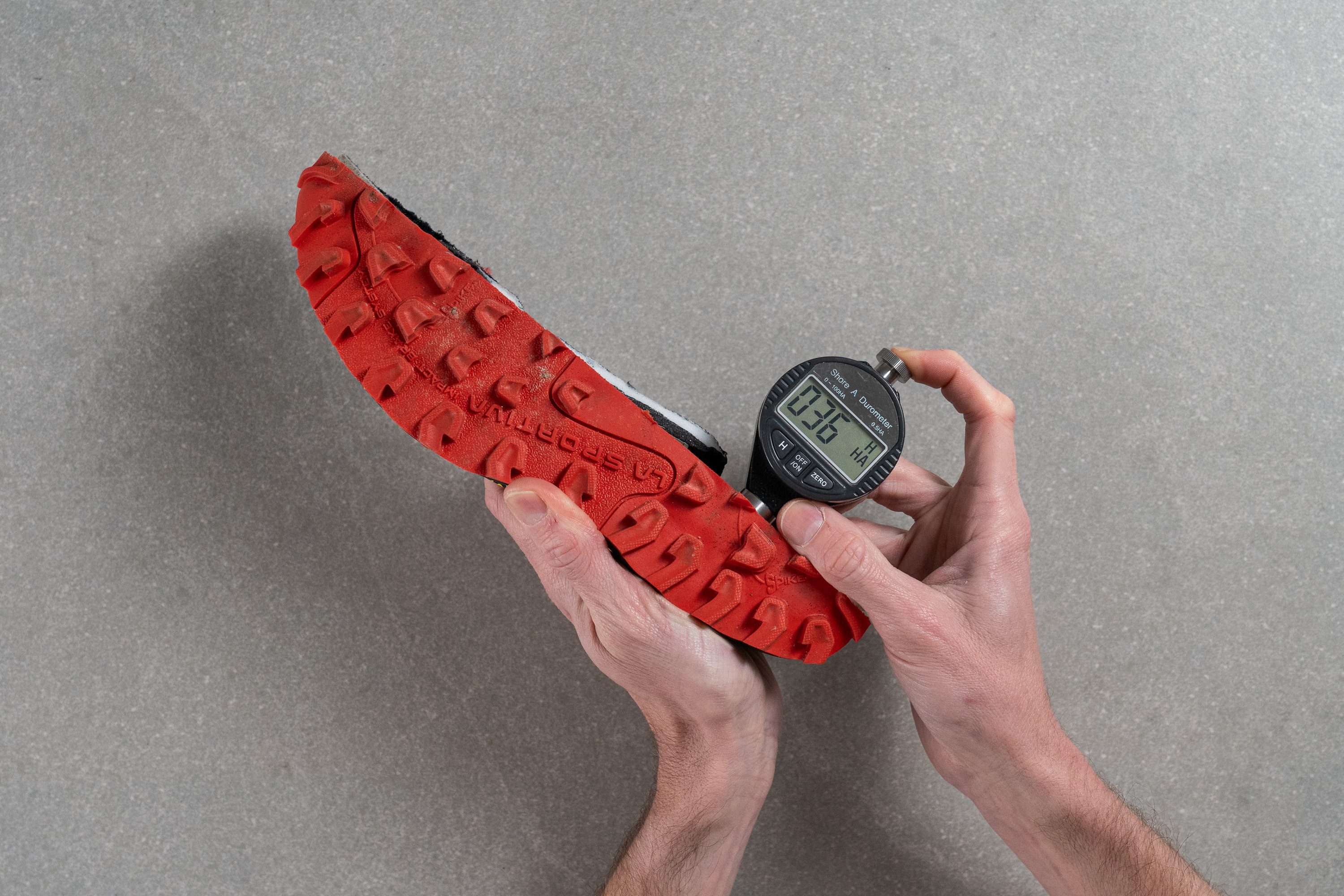
| Mutant | 36.1 HA |
| Average | 22.8 HA |
Midsole softness soft to firm
To simulate winter conditions, we placed the shoe in our freezer for 20 minutes. Afterward, we conducted the durometer test again. This time, the measurement came out to 38.4 HA.
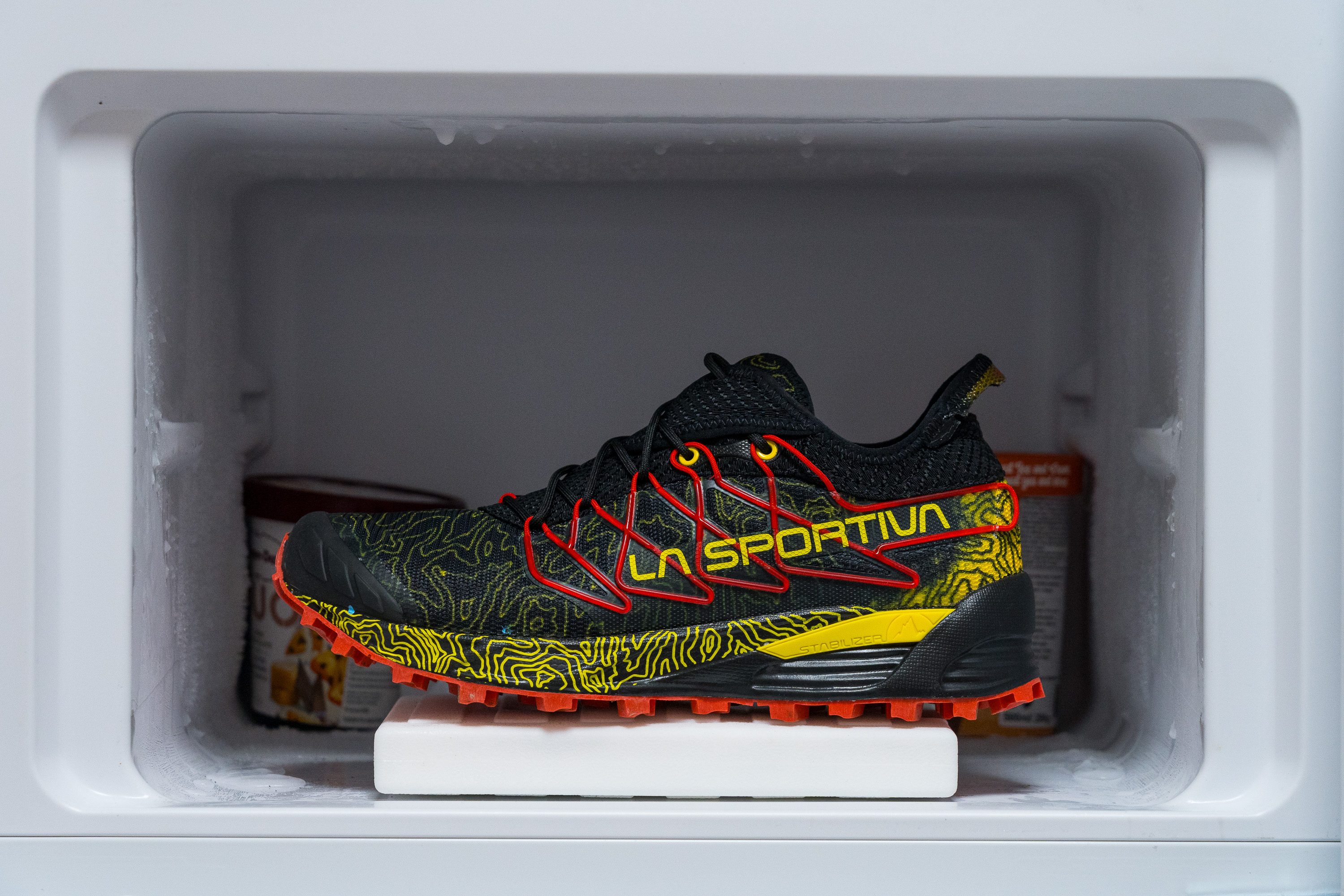
| Mutant | 38.4 HA |
| Average | 28.5 HA |
oz / 262g
That's an excellent result as it represents only a 6.2% increase, which is quite minimal. However, given the midsole's inherent firmness, any difference in stiffness wouldn’t have been noticeable regardless of the change.
| Mutant | 6.2% |
| Average | 26.5% |
Stability
Lateral stability test
The Mutant, with its firm foam and design for technical terrain, offers great stability.
Another eccentricity from La Sportiva that we liked is the bizarre lacing system.
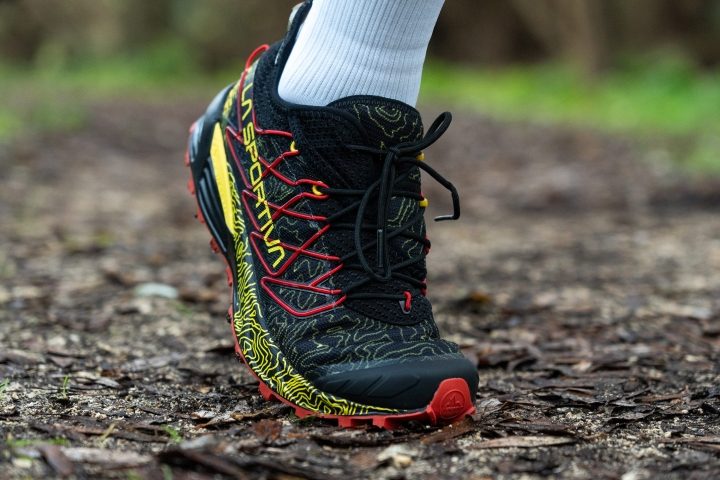
Integrated into the upper through their FusionGate technology, this design allows for adjusting the inner volume and how snugly the foot fits, enhancing stability on technical terrain.
Torsional rigidity
Due to its high sidewalls, particularly in the heel, and the brick-like firmness of its midsole, the Mutant exhibits significant torsional rigidity, enhancing its stability.
In our manual assessment, we gave the shoe a score of 5 out of 5 in this test.
| Mutant | 5 |
| Average | 3.5 |
oz / 270g
The heel counter is designed with comfort in mind. We found it to be more flexible and gave it a rating of 3 out of 5. This tried-and-true approach makes the shoe suitable for a variety of uses.
| Mutant | 3 |
| Average | 3.1 |
Midsole width in the forefoot
Now let's examine the dimensions of the Mutant.
We measured the sole at its widest part in the forefoot and found it to be 110.3 mm. This size is comparable to most trail shoes, but it leans towards a narrower design. This helps in effectively navigating technical terrain and also aids in not adding any extra weight.
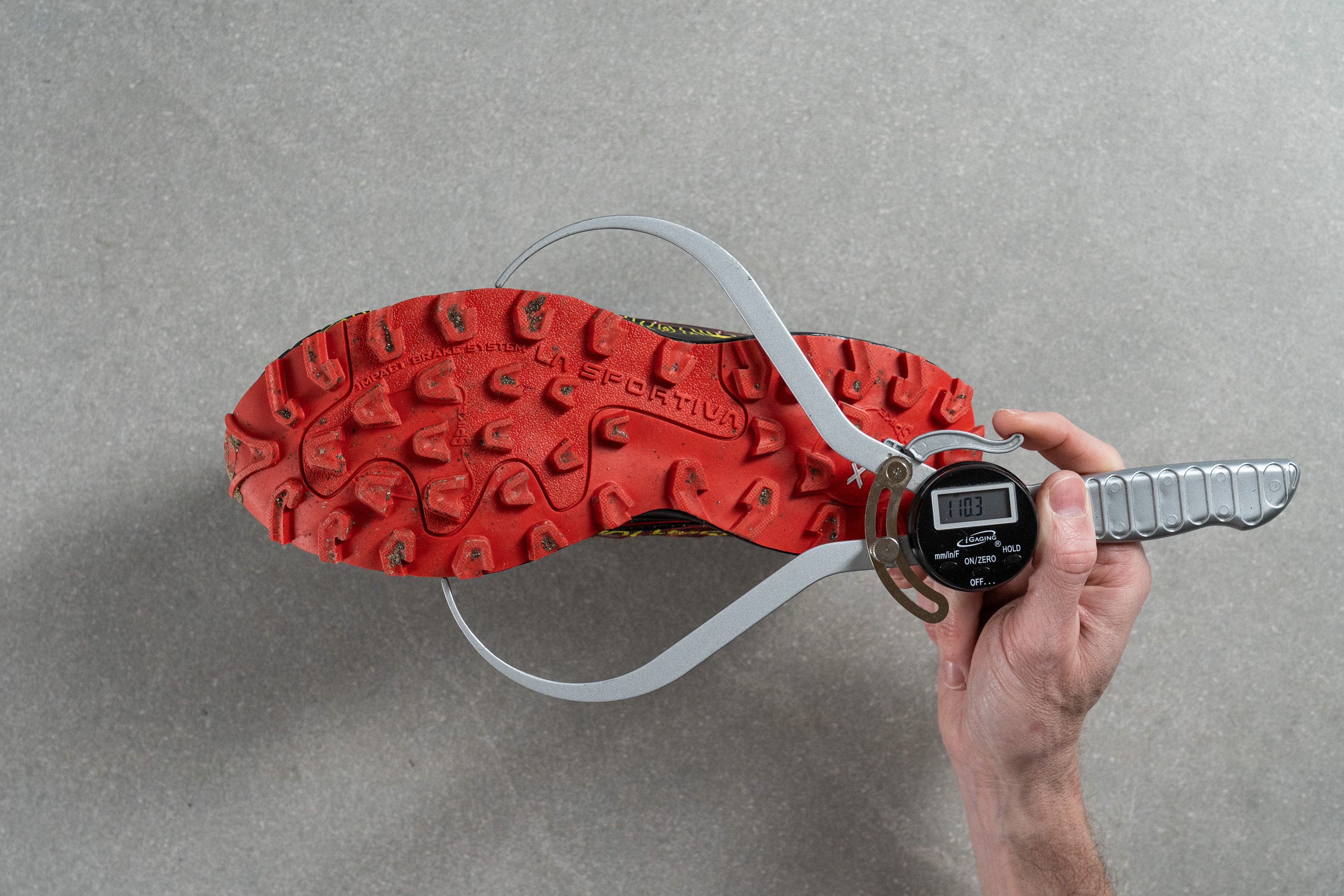
| Mutant | 110.3 mm |
| Average | 112.0 mm |
Hoka Speedgoat 5
The heel is on the narrower side too, might be a bit too much for our liking at 86.3 mm.
For those concerned about rearfoot stability, a wider option that still manages technical terrain, such as the Hoka Speedgoat 5, would be a more suitable choice.
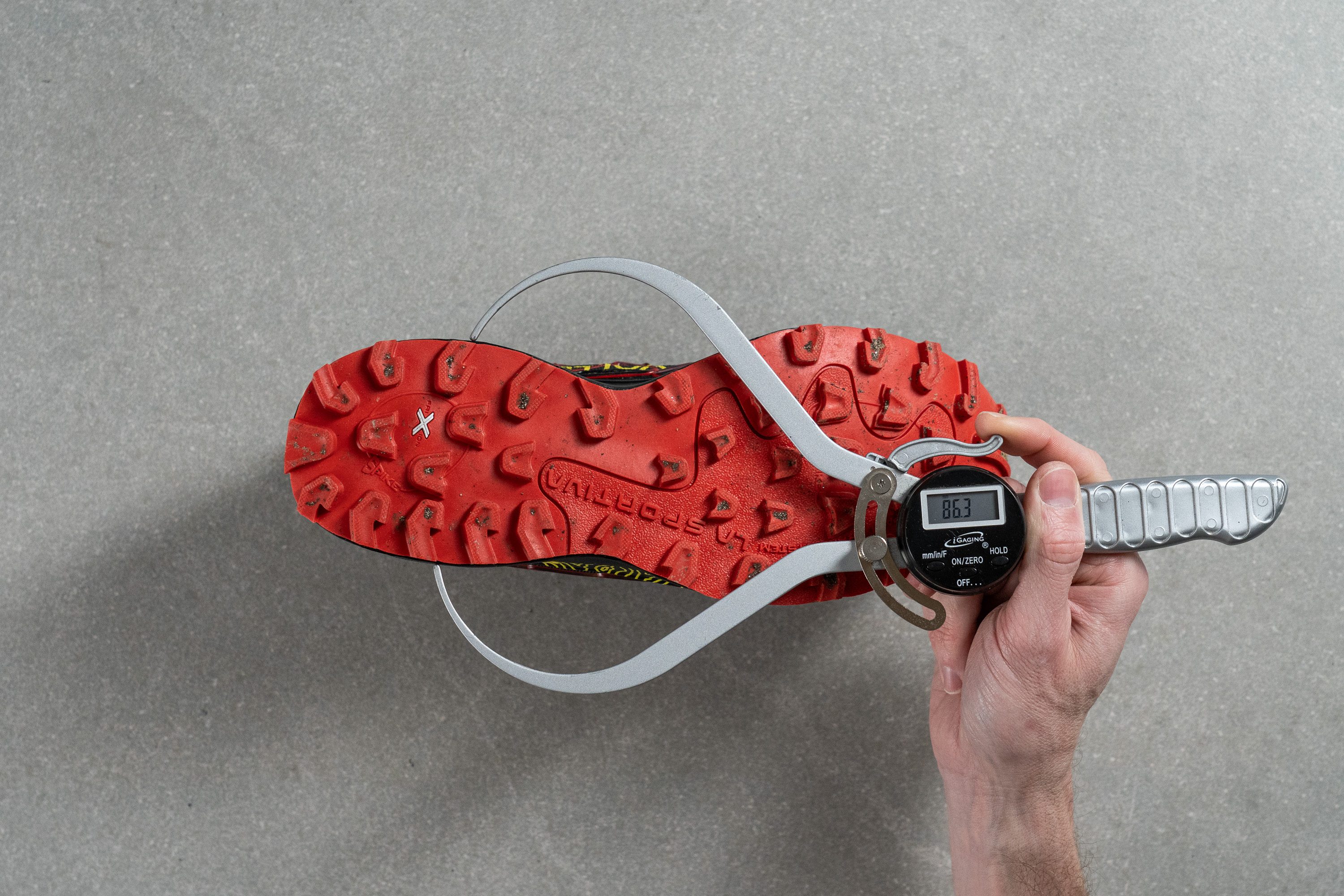
| Mutant | 86.3 mm |
| Average | 89.7 mm |
Flexibility
Stiffness
To masterfully handle technical descents and adapt to challenging areas with roots or large rocks, the Mutant needs to be flexible lengthwise. Fortunately, it excelled in our 90-degree bend test with a score of 21.3N, solidly confirming its adaptability.
| Mutant | 21.3N |
| Average | 28.3N |
Stiffness in cold
When exposed to cold temperatures, the shoe showed a slight change. After leaving it in our freezer for 20 minutes and re-testing, we found a fairly similar result, measuring 24.6N.
| Mutant | 24.6N |
| Average | 38.3N |
Another eccentricity from La Sportiva that we liked is the bizarre lacing system
That's just a 15.5% increase, which, again, is hardly noticeable underfoot.
| Mutant | 15.5% |
| Average | 35.2% |
Grip / Traction
Lug depth
Designed for adventurous runs on technical terrain, La Sportiva has equipped the shoe with deep 5.0-mm lugs for exceptional rock grip.
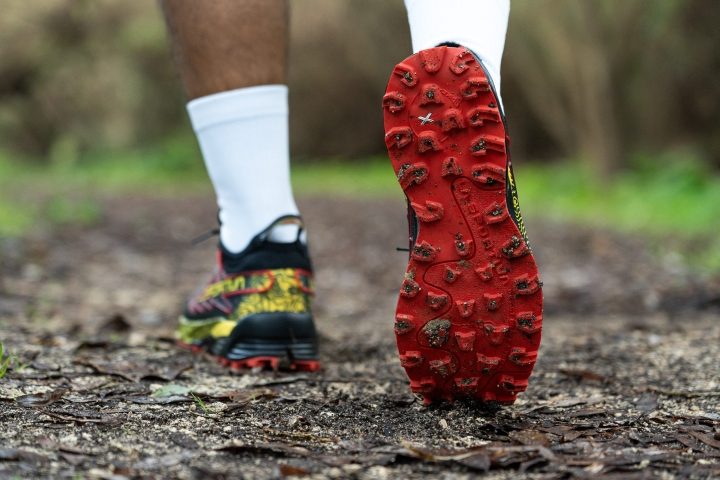
The lugs, a standout feature of the FriXion White outsole, are widely spaced and multi-directional, offering phenomenal traction on complicated surfaces. We think they are absolutely perfect for navigating surfaces like mud, roots, deep grass, or marsh trails.
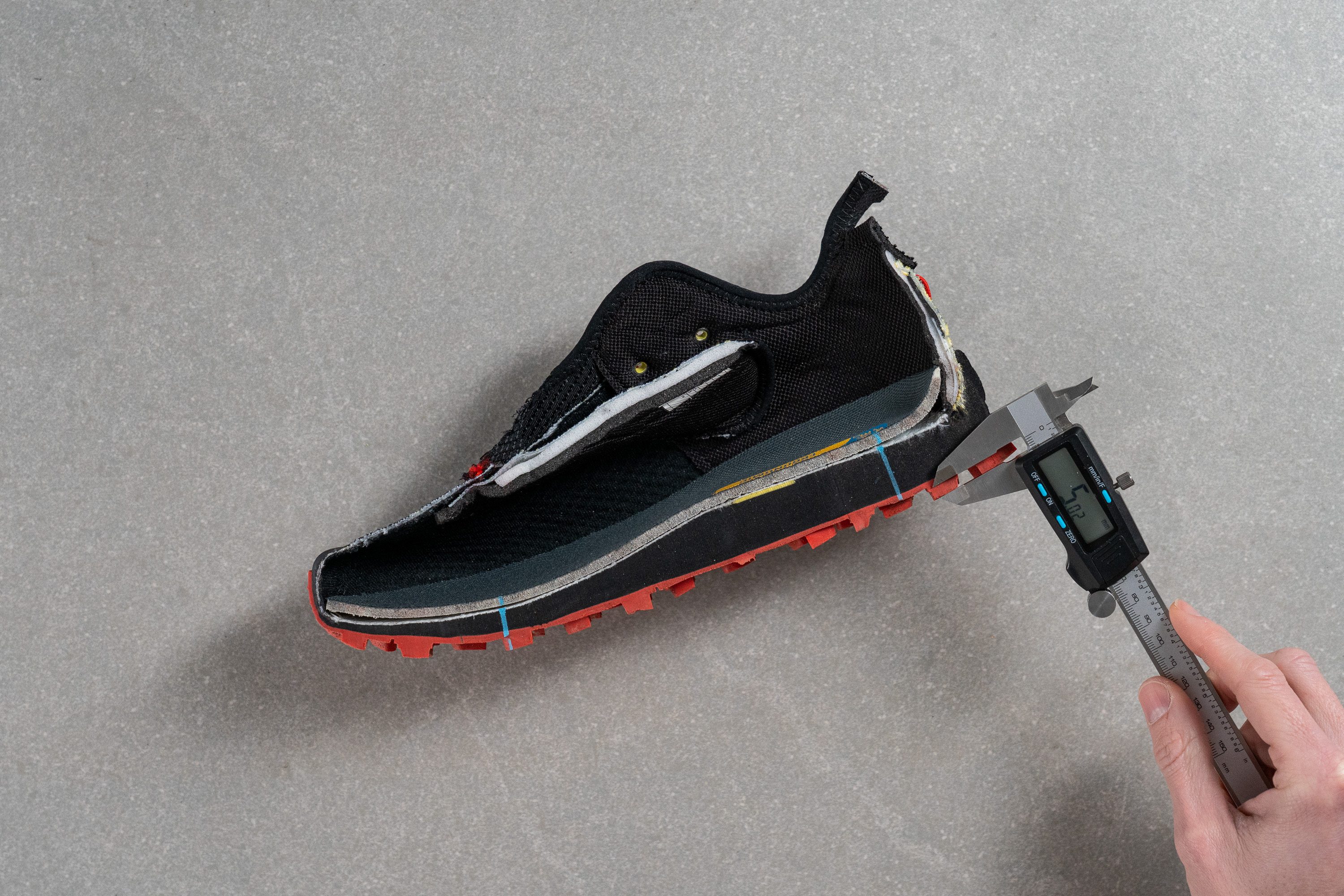
| Mutant | 5.0 mm |
| Average | 3.6 mm |
Size and fit
Toebox width at the widest part
With its narrow platform and being from a European manufacturer, it was obvious the fit would be snug, but we wanted to measure it.
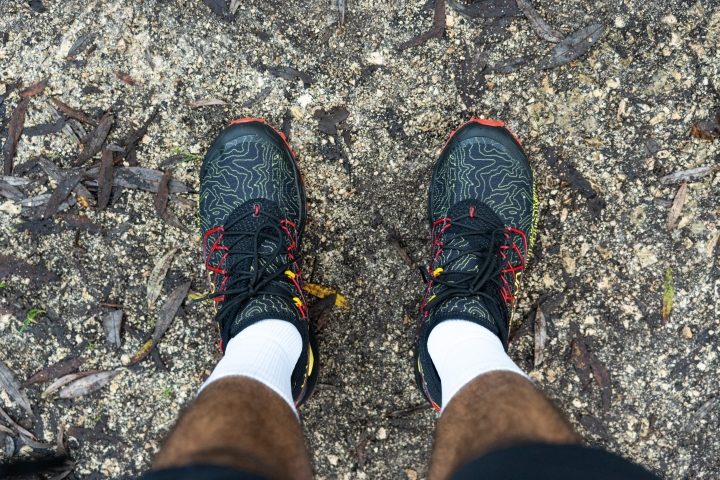
Sure, it's on the narrow side, but hey, the upper looks fantastic.
Our caliper showed the widest part of the upper at 95.3 mm, so it's ideal for those who prefer performance-fitted uppers. However, if you have wide feet, this shoe might not be the best choice for you.
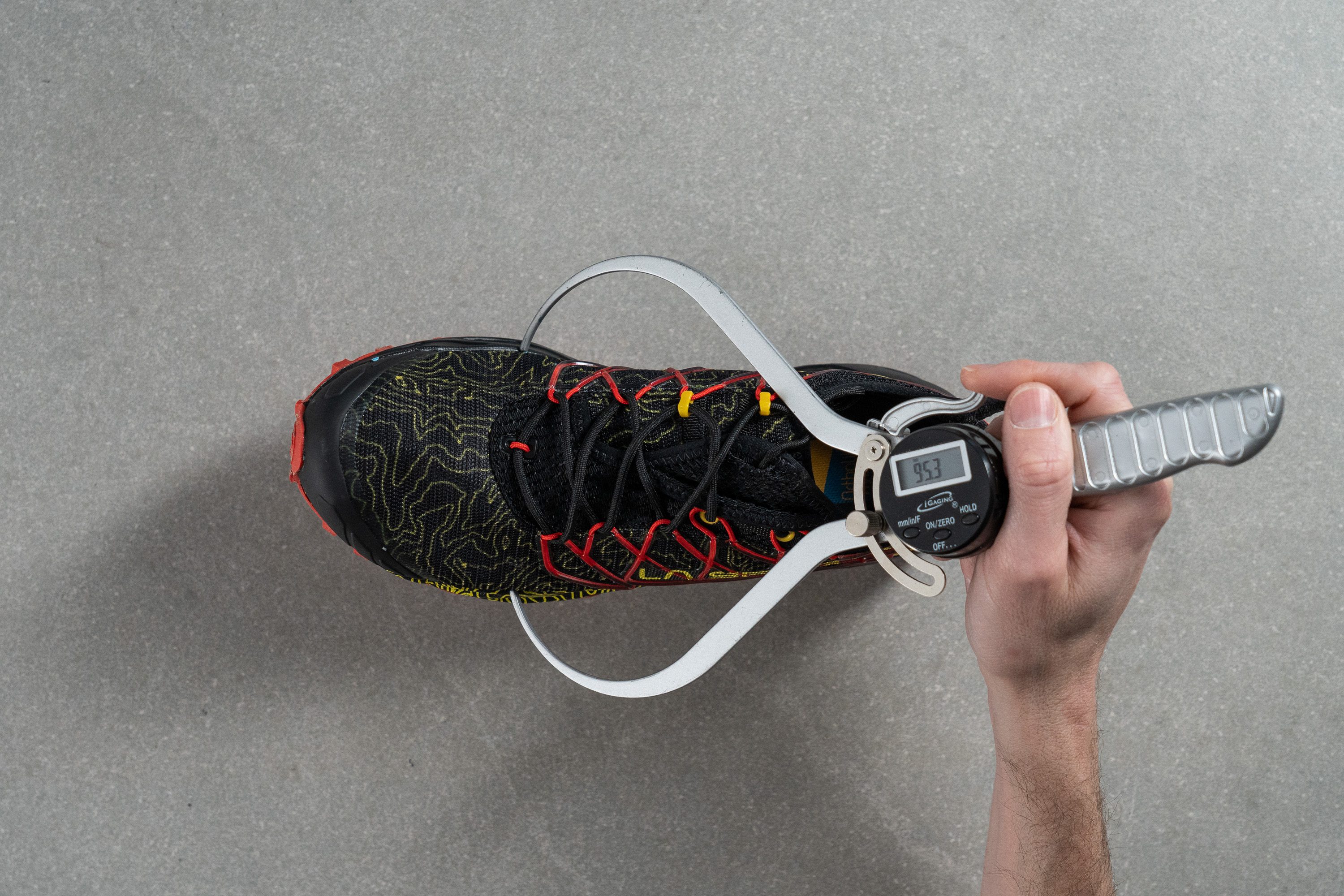
| Mutant | 95.3 mm |
| Average | 98.8 mm |
Toebox width at the big toe
In the big toe area, things improve significantly. The shoe doesn't taper excessively (78.3 mm), providing ample space for toes to comfortably splay out.
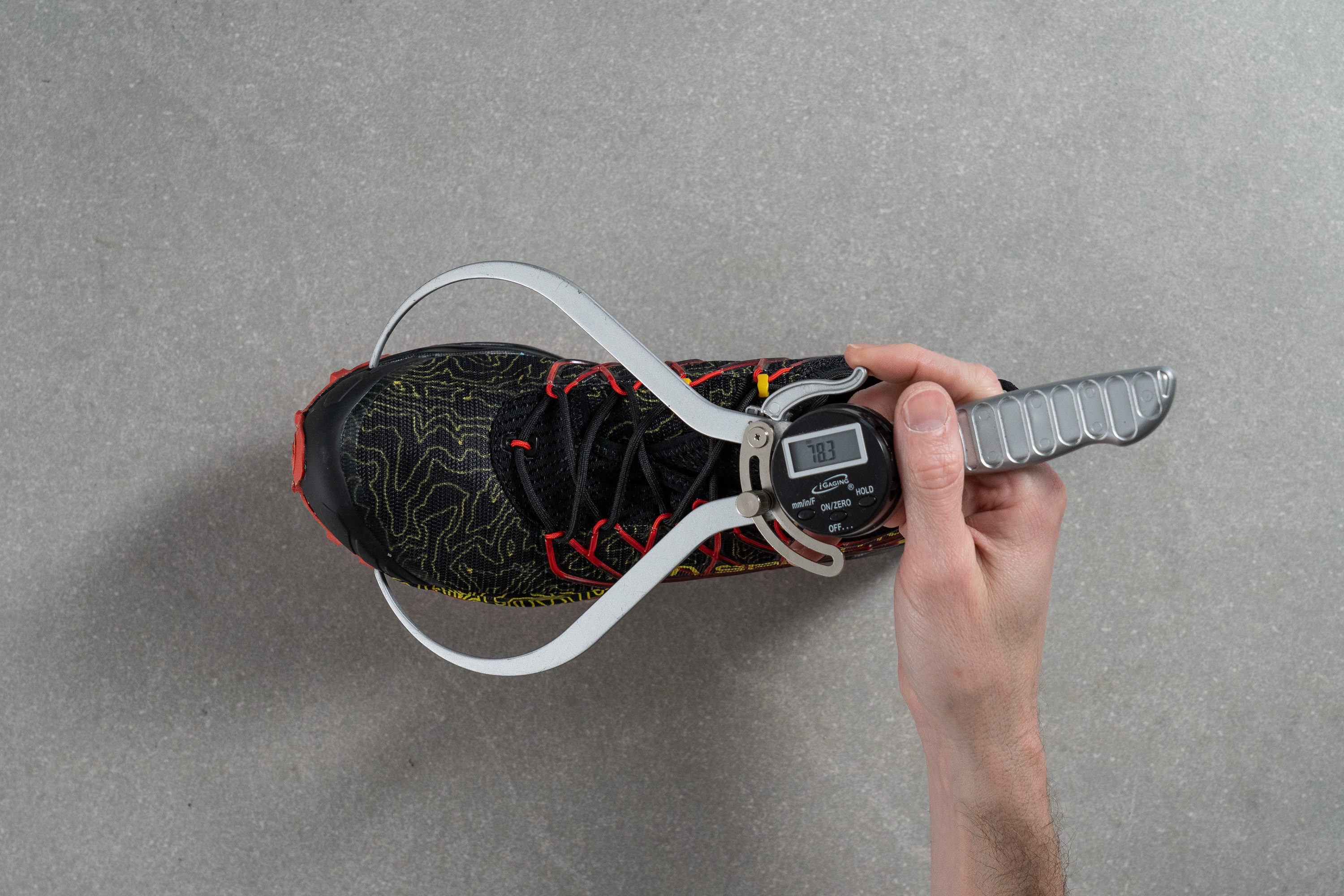
| Mutant | 78.3 mm |
| Average | 78.9 mm |
Tongue: gusset type
The tongue lacks any gusset, meaning it's not secured to the sides, which could lead to it shifting during runs. Although the shoe tends towards a snug fit, this oversight is still a notable drawback.
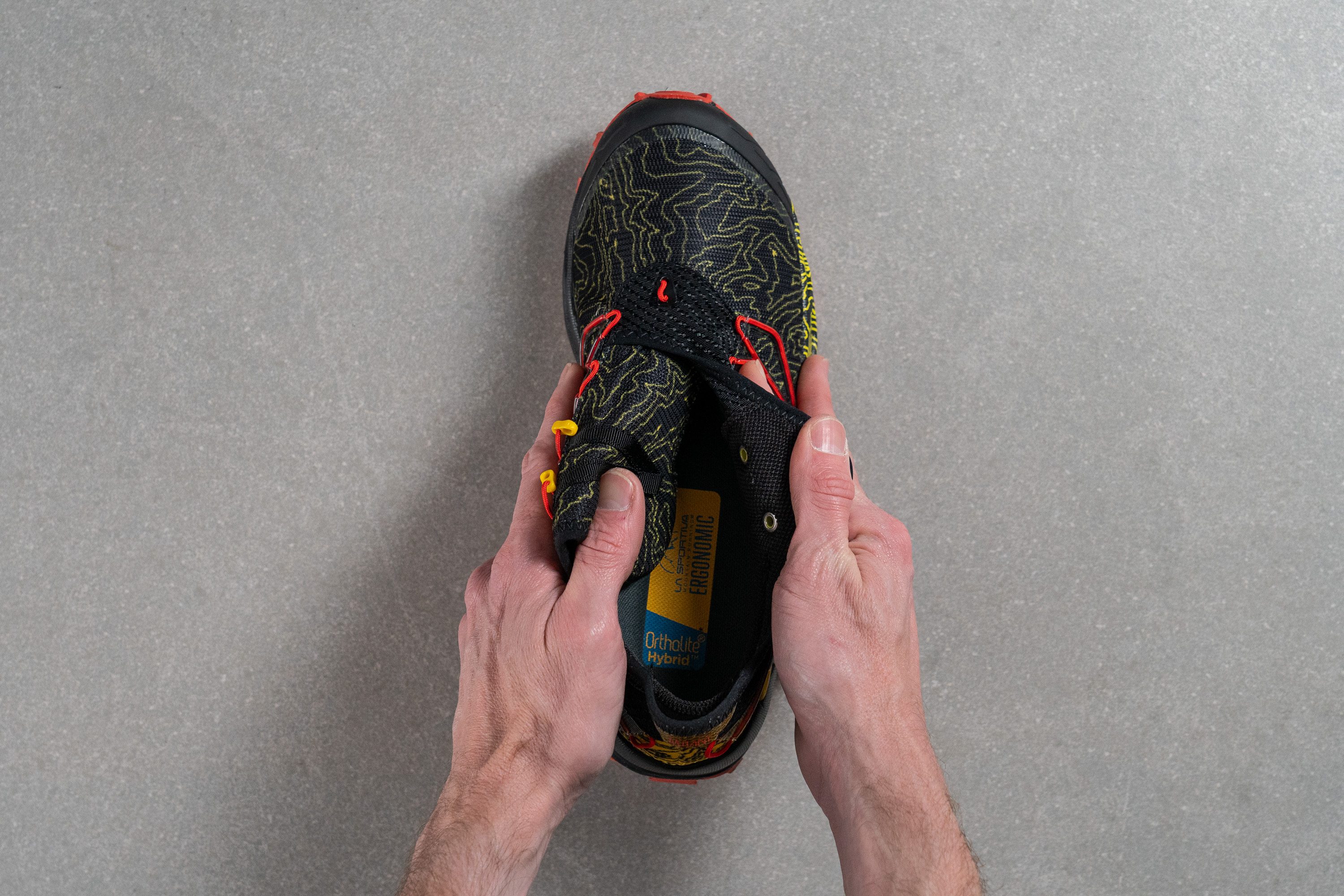
| Mutant | None |
Comfort
Tongue padding
The tongue is overly padded at 10.2 mm, which we see as a poor choice for this particular shoe.
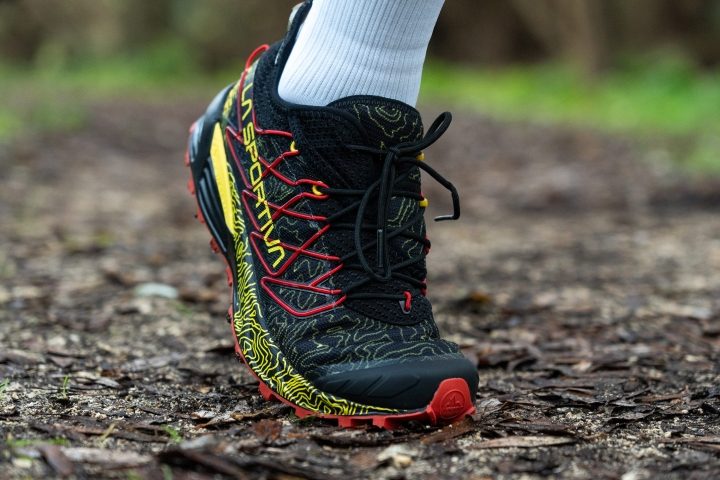
Less padding could have sufficed, especially since the shoe is already quite heavy. A wiser move would have been to reduce some of that extra weight.
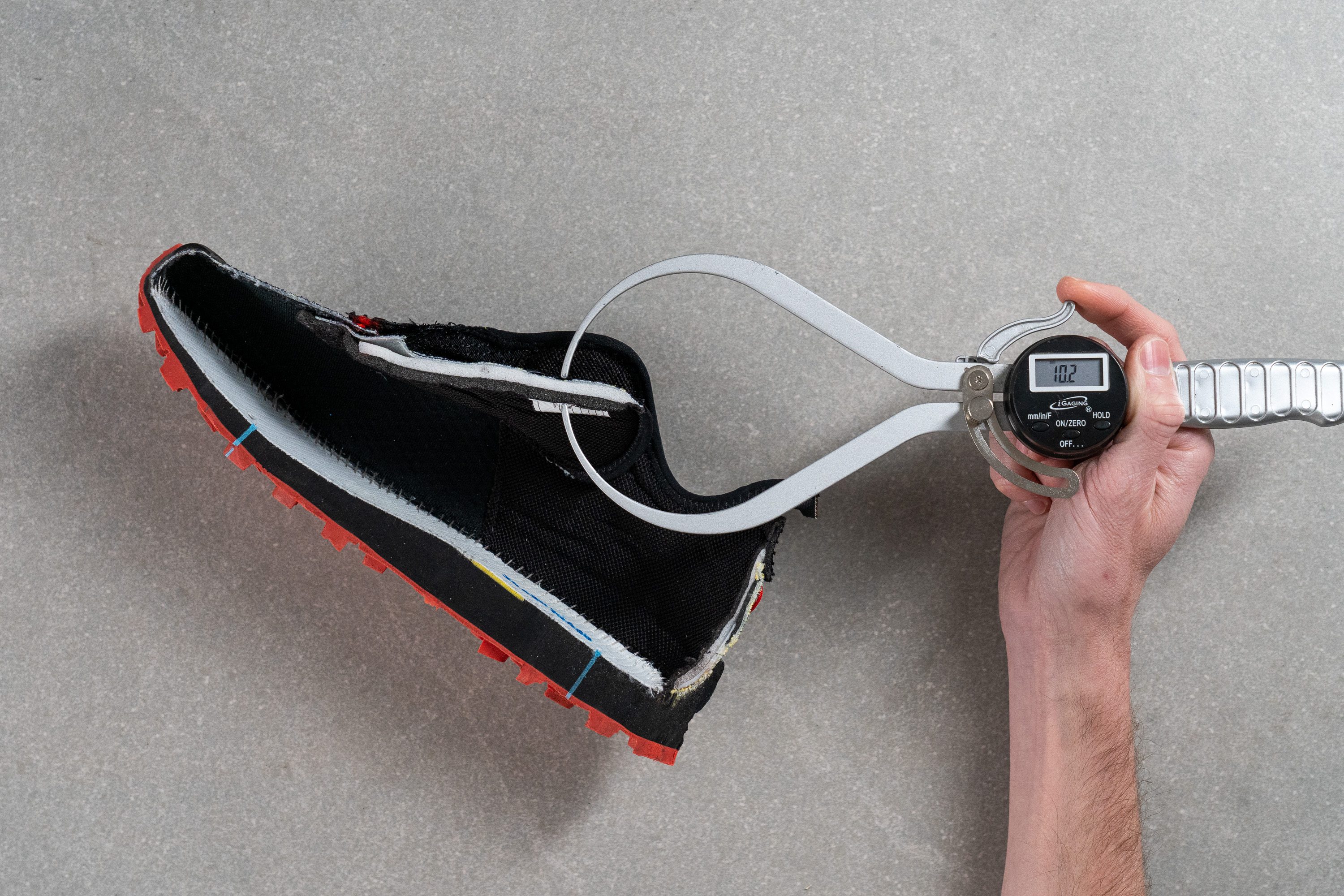
| Mutant | 10.2 mm |
| Average | 6.4 mm |
Heel tab
At the back, we spotted a bizarre—again—finger-loop heel tab, the kind of cool design only a brand like La Sportiva, unafraid to take risks, could come up with. It's truly a standout heel tab, extending from the heel collar in a way we haven't seen in almost any other shoe.
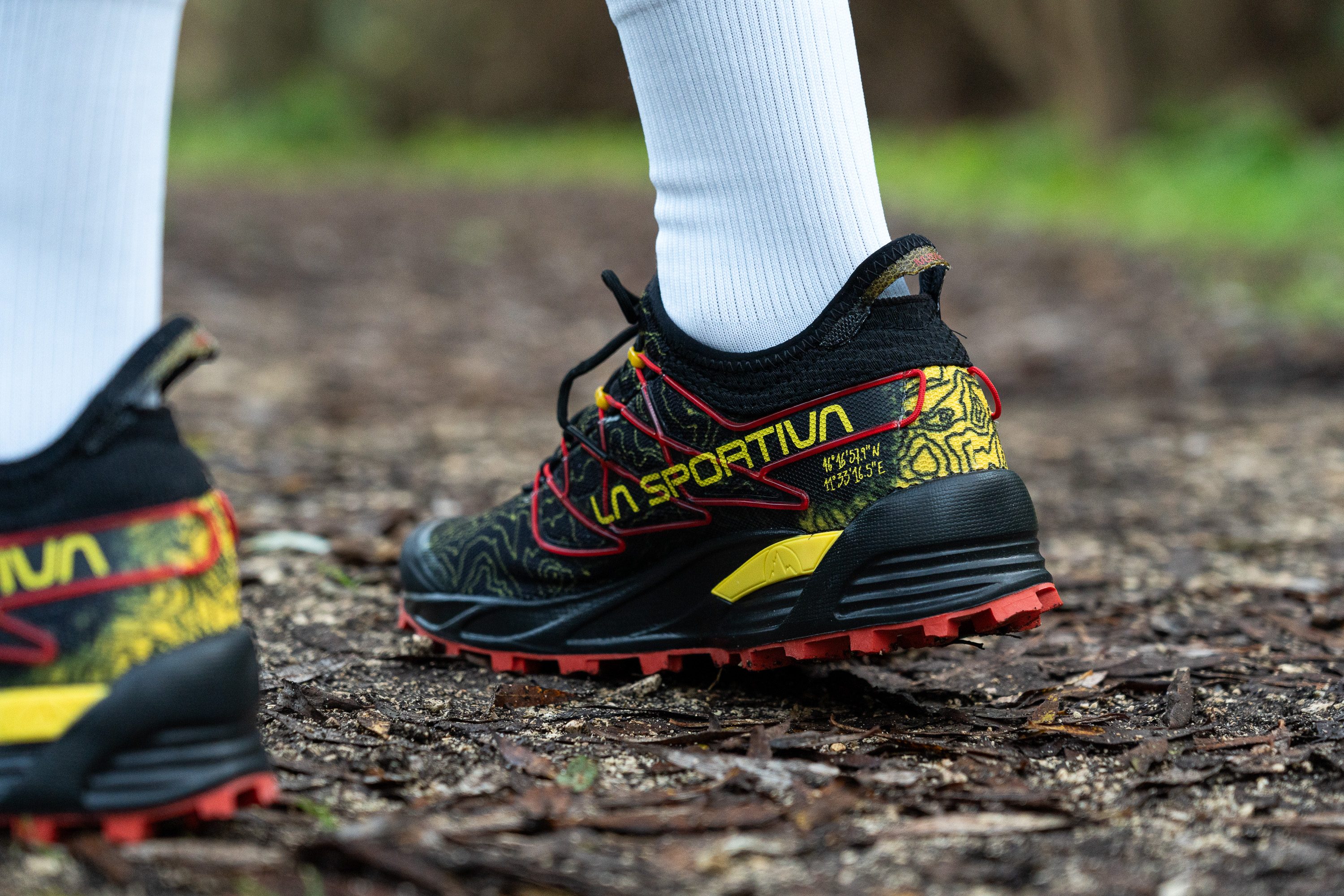
| Mutant | Finger loop |
Removable insole
The insole is removable, so you can easily put in custom orthotics if needed. But if you're unsure, the Ortholite insole that comes with it is pretty good and might be worth sticking with.
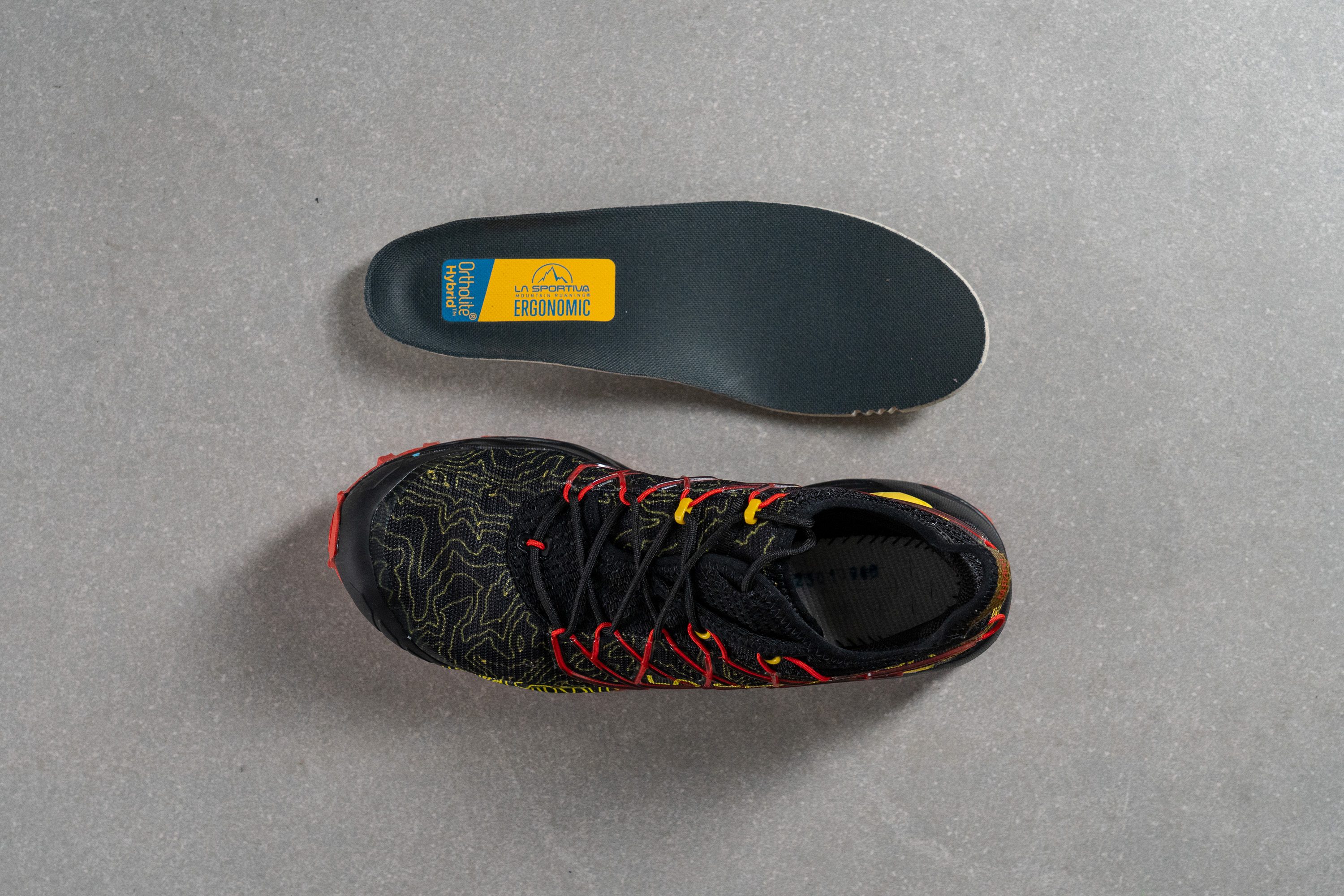
| Mutant | Yes |
Misc
Reflective elements
The Mutant doesn't have any reflective pieces at all.
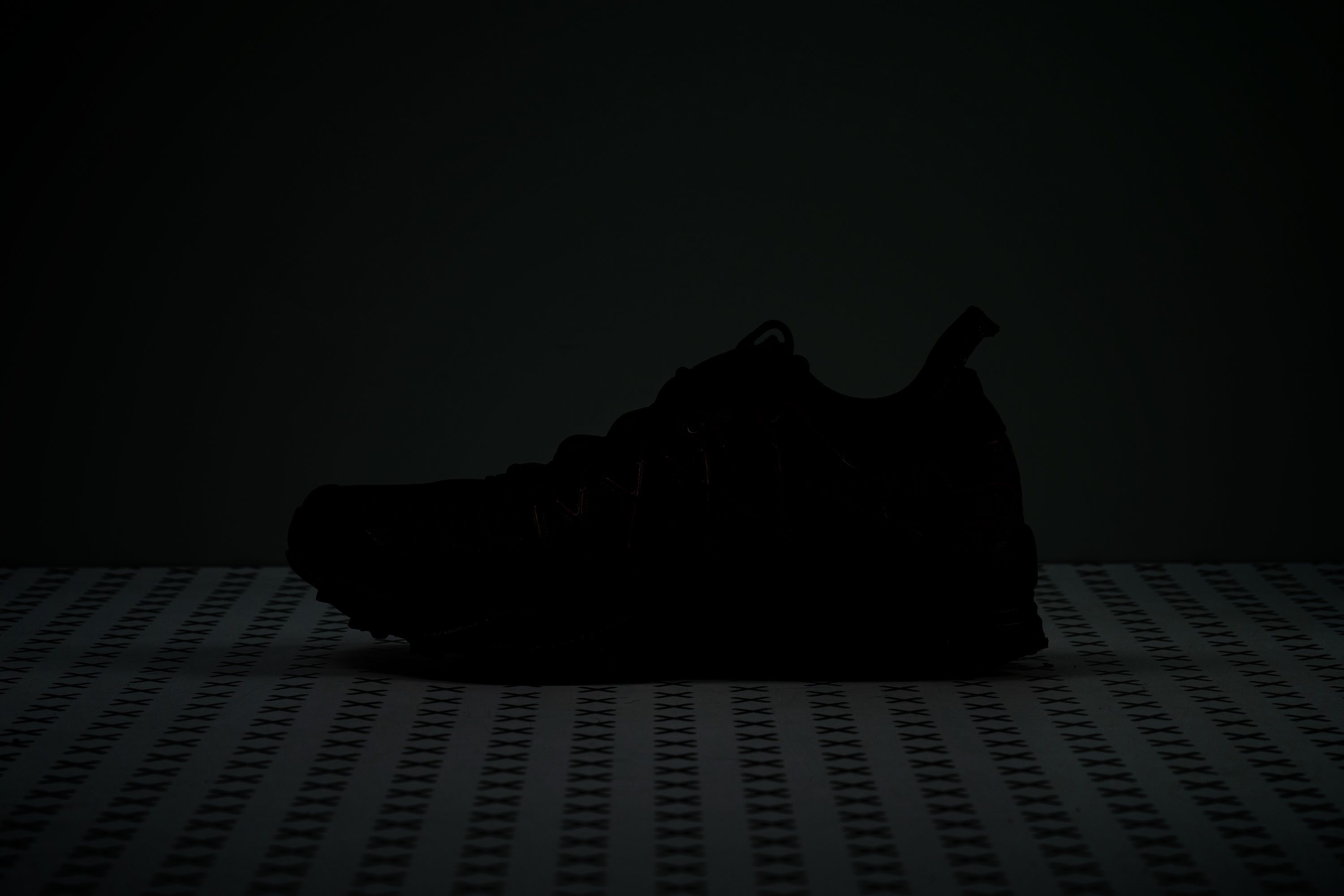
| Mutant | No |

